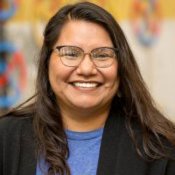South Dakota State University faculty and staff are touring South Dakota’s tribal communities this spring to better understand and support current and future American Indian students on campus.

SDSU’s Wokini Initiative has partnered with Margaret A. Cargill Philanthropies to create the professional development training series for SDSU faculty and staff. It aims to foster a culturally responsive and supportive campus environment for American Indian students to increase their retention and graduation rates.
The SDSU-Tribal Nations Bus Tour starts Monday.
Staff and faculty have been invited to join five free tours that will take them to South Dakota’s tribes: Cheyenne River and Standing Rock (May 15-18), Yankton and Rosebud (May 22-25), Pine Ridge (June 5-8), Lower Brule and Crow Creek (June 12-14), and Sisseton Wahpeton and Flandreau (June 19-20). Each tour, ranging from two to four days apiece, will connect participants with one or two tribes throughout May and June, visiting important highlights for each community. They can participate in one or all tours.
Sarah Bad Warrior-Vrooman, director of Wokini and tribal relations for SDSU, said the university has organized these types of trips in the past, and the grant is helping bring them back.
“(Participants) get an understanding of the tribes and our Native American students, staff and faculty as well, and that builds not only networks and relationships, but it also gives them an idea of where we come from and what’s important to us,” Bad Warrior-Vrooman said.
Staff and faculty “can develop relationships with the tribes, and the tribes can also understand who we are here at South Dakota State University, that we do care about our students. … They also understand where our students are coming from and get to know them on a different level now that they’ve been to where they live, heard their stories.”
It’s important that faculty and staff know that the tribes are all different and have their own stories, she added. On the tours, each tribe is directing what they want to showcase.
“For us to go out there and show that respect and want to learn about them really does, in their eyes, demonstrate that we’re interested,” Bad Warrior-Vrooman said.
The new knowledge participants take away from the tours increases support for students and tells faculty and staff who to reach out to within tribes if needed resources aren’t immediately available on campus.
Parts of upcoming tours include learning what tribes are doing with their buffalo herds, visiting tribal schools, colleges and companies, and holding a cultural night with tribal elders sharing their history. Traditional American Indian meals will also be part of the trips, and stops are planned at Crazy Horse, Wind Cave and Black Elk Peak.
“The tribal members are really excited about this,” Bad Warrior-Vrooman said.
- Contact:
- Telephone number: 605-688-5544
Republishing
You may republish SDSU News Center articles for free, online or in print. Questions? Contact us at sdsu.news@sdstate.edu or 605-688-6161.

